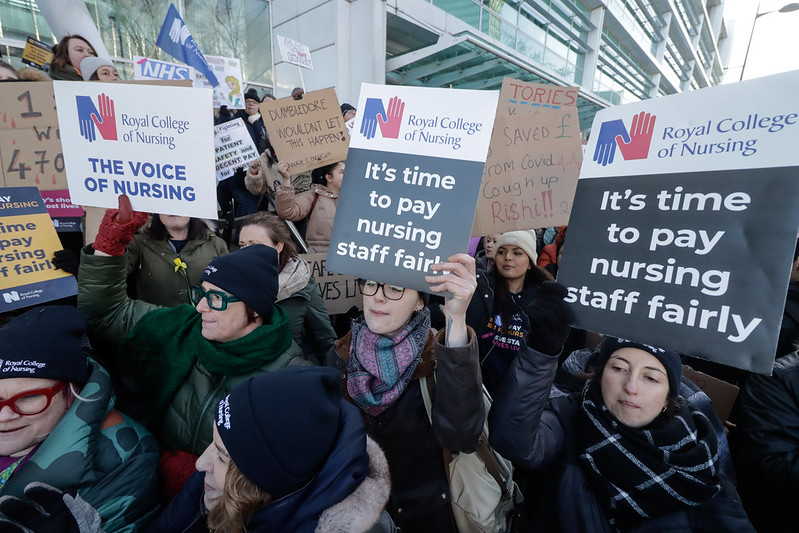Spare a thought for the RCN’s beleaguered leadership. A month ago, they thought they had secured a sticking-plaster pay deal for nurses, stewarded the membership through previously unprecedented industrial action, and secured a semi-dependable commitment from the government to take nurses out of the Agenda for Change pay-scale, enabling them to achieve better future pay deals (unencumbered by pesky porters, physios, and pharmacists etc.).
It was a deal achieved by being the first NHS union to suspend strike action and enter talks, which forced other NHS unions to follow suit for fear of being left out in the cold during negotiations. The RCN’s leadership was emphatic in their support for the deal, with General Secretary Pat Cullen saying it represented the “final offer” from the government. Other NHS unions kept their powder dry, with Unite not recommending members accept, and UNISON recommending they do – but with less of the doom-laden, all-or-nothing messaging than what was released by the RCN.
Now, after RCN members voted to reject the pay deal (where the RCN’s messaging and decision to let members change their votes probably worked against it) it has had to announce forty-eight hours of strike action, starting on the 30th of April, at all the trusts that it covered by its industrial mandate. It has also withdrawn all derogations (exemptions to strike action) for members, which it had previously tried to avoid. The RCN has had to rush to action because its mandate expires in the middle of next month and after that it will have to re-ballot, allowing the government a respite.
However, following UNISON’s acceptance of the pay deal, it is very possible that a majority of unions on the NHS Staff council (or at least a majority of the weighted union votes) could vote to accept the deal and the government then decide to implement it anyway. In one sense this would not be that unusual, in the recent Network Rail dispute, the Transport and Salaried Staff Association decided to accept a deal that the RMT rejected and then benefited from the RMT’s action manifesting a better deal. However, the RCN would find itself in a slightly different situation if the majority of the Staff Council accepted it as it would add more legitimacy to the deal.
This situation is entirely of the RCN’s own making. Having done relatively well with its first ever national ballot in England, achieved with good shop-floor organising and paid staff brought in on fixed-term contracts (probably not the best employment practice, but oh well), the RCN leadership then dithered. The first set of strikes were two isolated days (the 15th and 20th of December), were only called at seventy-six of the one-hundred and thirty trusts the RCN had a live mandate at, and included derogations, and tying both hands behind the RCN’s back. This was indicative of a profession and leadership new to militancy struggling to find their feet. In short, the RCN did not capitalise on its industrial mandate.
This error was compounded by the RCN’s refusal to coordinate with any of the other unions on the Agenda for Change pay scale (in fairness the other unions aren’t exactly saints when it comes to this) and its desperation to reach a settlement as soon as possible as it chased the goal of extracting nurses from Agenda for Change. This is why the RCN suspended strikes and entered ‘intensive talks’ with the government in February, which were only offered after the RCN escalated action and threatened to remove derogations, and undercut the other unions in the process.
While the RCN has every right to exert its strength how it seems fit, this was naïve and reduced the scope of the deal that could have been achieved. Without the industrial muscle of the RCN, the other unions decided that the deal offered by the government was the best that they were able to achieve at that given time. However, in another example of its callowness, the RCN leadership underestimated how much even the relatively piece-meal industrial action had motivated its members. Essentially the RCN had told its membership that pressing the magic strike button a couple of times would bring complete victory. Understandably, its membership was not impressed when this proved overly optimistic.
It’s anyone’s guess what will happen next with the Agenda For Change deal. Perhaps the RCN will do well in its re-ballot, adopt a more assertive, or depending on your point of view reckless, strategy and secure an improved deal. After all, the current deal would not have been achieved without industrial action. Alternatively, maybe the government will impose the deal and the action will fizzle out. Trying to understand what is happening right now is hard enough, let alone predicting the future. However, it would be deeply ironic if the RCN ends up in the minority of the NHS Staff Council by rejecting a deal that only exists because of its own previous trepidation and lack of solidarity.


